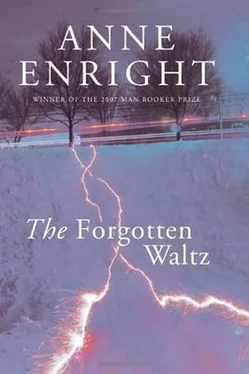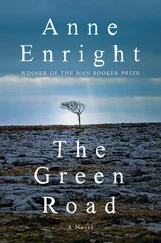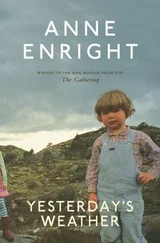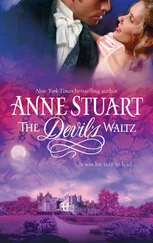‘Then again.’
There was, when we made love at the end of these long Saturdays, a sense in which we were reclaiming ourselves for ourselves, after some brief theft.
You walk into a stranger’s house and it is exciting, that’s all, and you are slightly soiled by it. I could feel it, in the second-hand, abandoned kitchens, and in my Sunday-supplement dreams. I could feel it drain away in the moments after waking, when I realised that we hadn’t bought, we probably never would buy, a house with a sea view. It didn’t seem a lot to ask – a house that would clean your life every time you looked out of it – but it was, apparently. It was far too much to ask. I did the figures up down and sideways and I never could believe the bottom line.
The bottom line was the place we had started out from, before we lost the plot. The bottom line wasn’t so much a house as an investment; somewhere to swing our cat, that was not too far out of town.
So we found exactly that; a townhouse in Clonskeagh for three hundred grand. We were the last in, bought off the plans, drank a bottle of Krug to celebrate – all one-hundred-and-twenty euros’ worth.
Krug, no less.
It was nice.
I loved Conor then. I really did love him, and all the versions of him I had invented, in those houses, in my head, I loved them all. And I loved some essential thing too; the sense of him I carried around with me, which was confirmed each time I saw him, or a few strange seconds later. We knew each other. Our real life was in some shared head space; our bodies were just the places we used to play. Maybe that’s the way lovers should be – not these besotted, fuck-witted strangers that are myself and Seán, these actors in a bare room.
Anyway. Before our lives became a desolation of boredom, rage and betrayal, I loved Seán. I mean, Conor.
Before our lives became a desolation of boredom, rage and all the rest of it, I loved Conor Shiels, whose heart was steady, and whose body was so solid and warm.
The weekend after contracts were exchanged, we went into the unfinished house and looked around. Then we sat on the concrete floor and held hands.
‘Listen,’ he said.
‘What?’
‘Listen to the money.’
The place was going up by seventy-five euro a day, he said, which was – he did the calculations under flickering eyelids – about five cents a minute. Which didn’t seem like much, I thought. Which seemed almost piffling, after all we had been through. Still, you could almost feel it, a pushing in the walls; the toaster would pop out fivers, the wood of the new-laid floors would squeeze out paper money and start to flower.
And, for some reason, we were terrified.
Don’t tell me otherwise.
The house fitted Lego-like with its neighbour, which had the basement and split the middle floor, and this threw me a bit, the fact that it was only half a house until you went upstairs. It was like the place had suffered a stroke.
Not that this was a problem, or at least not a problem you could identify. I just hadn’t expected it. And I still dream about this house, about walking up those steps and opening the front door.
The day we moved in, Conor was inside in among the boxes, sitting at his laptop like a demented organist, cursing the internet connection. I didn’t complain. We needed the money. The next few months were all about work and there was something frantic and lonely about our love in that little house (don’t get sentimental, I tell myself, the sockets moved in the wall every time you stuck in a plug). We clung to each other. Six months, nine – I don’t know how long that phase lasted. Mortgage love. Shagging at 5.3 per cent. Until one day we decided to take out a couple of car loans and get married on the money instead.
Vroom vroom.
It was the silliest thing we had ever done – either of us – and it was surprisingly good fun. It happened, after much fuss and diplomatic incident, on a lovely day in April; church, hotel, bouquet, the lot.
About seven hundred of Conor’s cousins came up from Youghal. I’d never seen anything like it: the way they stood their rounds of drink, fixed their little hats in the mirrors, and checked the weight of the hotel cutlery when they picked it up to eat. They treated the day like a professional engagement, and danced until three. Conor said it might as well be your funeral; he said they hunt in packs. And my mother – who had, it turned out, ‘always been saving for this day’ – led a seasoned troupe of the Dublin middle classes, many of them old, all of them entirely happy, as they chatted and sat and sipped their peculiar drinks: Campari, whiskey and red, Harvey’s Bristol Cream. We were just the excuse. We knew it, as we went upstairs to change out of our duds and ride each other rotten against the back of the bedroom door. We were beside the point. Free.
My mother is there in the photograph album (five hundred euro, bound in cream leather, now mouldering under the kitchen counter in Clonskeagh). She wore a lilac-grey suit and a fascinator, no less, in grey and mauve, complete with face net, and those funny black feathers that arc out, stripped to bobbing dots of black. She is there beside me. Tiny. Her hair a kind of mystery; she had it caught up some way at the back. My mother’s favourite film was Brief Encounter , she knew how to cry under a veil. And she always spent money on her hair. Even when she was skint, she had a way of convincing people to make her look beautiful, that it would be possible, and they did their best by her. When it comes to the hairdresser’s, she used to say, it pays to leave your moods at home.
She wouldn’t give me away, refused point blank, fixed me up instead with my father’s brother; a man I had not seen since I was thirteen years old. I thought we might meet the day before, at least, but he turned up on the morning, fresh from the airport, and when everyone went off in the first car, we were left in the front room looking at each other, while the driver idled outside.
It was the strangest moment of a very strange day. I stood trembling at the window, in my pewter silk Alberta Ferretti with a mad Philip Treacy yoke (you might even call it a fascinator) stuck to the side of my head, and every time I made to move, this guy checked his fat watch and said:
‘Make them wait. You’re the bride.’
Finally, at some mysteriously ordained moment, he crossed the living room carpet, took me by the shoulders, and said, ‘You know who it is you remind me of? My own mother. You have her lovely eyes.’
Then he offered me an old-fashioned arm and conducted me out to the car.
Was that the creepiest bit? Taking the slow march down the aisle on the arm of this old geezer, who hadn’t expressed an emotion, by the look of him, since 1965? I don’t know. The local church, which does a good line in cherry blossom, also has a very peculiar crucifix suspended over the altar. A huge thing, made of wood. The figure of Christ, which isn’t especially gory, hangs not just on the front, but also on the back of it – this for the people who end up on the other side of the altar. And it distracted me throughout the ceremony, the way it used to distract me as a child, this double Jesus, back to back with His own reflection. Standing there, in two-hundred-and-twenty euros’ worth of underwear, never mind the dress, I wanted to say, ‘What were they thinking?’ This just a milder version of the things that used to flash through my head in this church – the shapeless obscenities that plagued my school years, and which started, at a guess, at my father’s funeral when I was thirteen. All grown-up, I stood where his coffin once lay (his ghost drifted, head first, through the small of my back), and I regretted my choice of basque over Spanx, while the priest said:
Читать дальше












